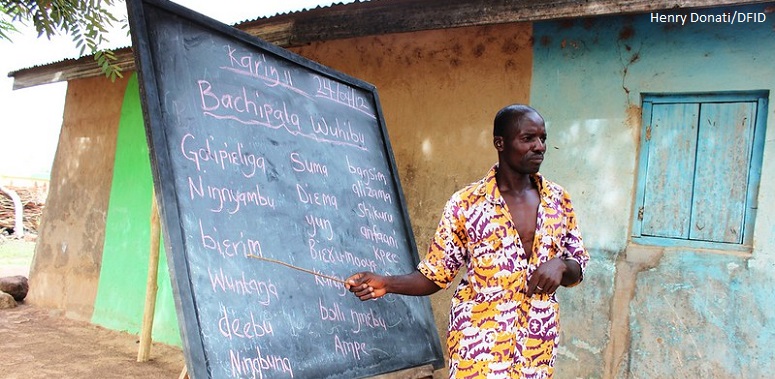Leadership for Learning Ghana
Project summary
Leadership for Learning (LfL) Ghana is a long-term collaborative research and development programme. It uses previous research outcomes to improve students’ learning through enhancing the leadership capacity of head teachers/school principals, at the same time as investigating the process, issues and effects of the programme. The research both informs the LfL work in Ghana, and provides evidence for policy-makers and practitioners elsewhere about a country-wide approach to developing school leadership for learning.
Previous research, including the doctoral work of a Ghanaian studying at Cambridge, identified the acute need for professional development for school leaders in Ghana. Teachers became school principals based on their seniority alone, and most head teachers had at best one week’s training focused on administration. At the same time (the early 2000s), a seven-country international research team led by the University of Cambridge investigated the connections between leadership and learning, and developed the LfL framework with five central principles.
Research is integral to the LfL Ghana programme. Data have been gathered from a wide range of participants using questionnaires, interviews, observations and other approaches including the analysis of text messages and the ‘Most Significant Change’ technique. These have all been designed to address the research aims of assessing the applicability of the LfL principles to a developing country national context, understanding the opportunities and challenges of doing so, and investigating the impact of LfL on basic schools in Ghana. At the same time, the research has been fed back and used to further the aims of the programme: the strengthening of school leadership, the improvement of pupil learning, and the influencing of policy makers.
The five LfL principles have all been found to be entirely applicable to basic schools in Ghana. They have been instrumental in helping headteachers, circuit supervisors and directors across the country to focus on pupils’ learning, to appreciate that teachers and school leaders also need to be learning continually, and to attend to the physical, social and emotional conditions for learning. This has been achieved through dialogue among all stakeholders, the sharing of leadership, and an understanding that everyone (pupils, teachers, school leaders, parents, community members and education service officials) has a part to play in improving learning.
Whilst the LfL framework has revealed many opportunities for improving leadership and learning in Ghana, there are also considerable challenges. These include the obvious limitations of poor resources and insufficient and unqualified teachers, as well as the legacies of both traditional and colonial attitudes and practices, and those challenges faced by every national educational reform programme.
LfL Ghana has impacted pupils’ learning, seeing large increases in reading and test results in some LfL schools. Head teachers and their schools have changed significantly to become more collaborative and learning focused. The LfL principles have been incorporated into the Ghana Education Service (GES) Head teachers’ handbook, and the GES has produced a Leadership for Learning manual for head teachers and circuit supervisors entirely devoted to enacting the five LfL principles.
The programme is ongoing, almost entirely now in the hands of Ghanaian partners, with plans for continuing research and development work.
Key outcomes:
- LfL principles and framework were found to be entirely applicable to basic schools in Ghana.
- LfL principles were adopted by the Ghana Education Service (GES), and used as the basis for head teacher professional development.
- LfL principles were incorporated into GES’s Head teachers Handbook (2010).
- GES published ‘Leadership for Learning: A manual/handbook for head teachers and circuit supervisors’ (2014) with five chapters each addressing a LfL principle.
- 15 Ghanaian educators undertook University of Cambridge accredited course as Professional Development Leaders.
- A cohort of 124 leading edge head teachers and their circuit supervisors from all 10 regions of Ghana were fully involved in research and development.
- By 2010, 3000+ head teachers had attended LfL workshops … many more since through GES.
- GES District Training Officers from all 10 regions were inducted into LfL.
- Regional and National Directors of Education attended LfL workshops.
- Low technology approaches were developed to support sustainability.
- SMS text messaging was shown to be effective and an efficient method of maintaining contact, engagement and commitment throughout the country.
- 3,000 LfL ‘fans’ (handheld resource summarising the LfL framework) were produced.
- There were reports of substantial gains in pupil
Research team
University of Cambridge Researchers: Sue Swaffield; John MacBeath; Louis Major; formally Stephen Jull
University of Malaya Researcher: Suseela Malakolunthu
Country Partners: Ghana Education Service (GES); Ghana Ministry of Education; Institute for Educational Planning and Administration, University of Cape Coast, Ghana; Yaw Ankomah, George Oduro and Alfred Ampah-Mensah; UNICEF
Duration
2009 - 2015
Funder
Commonwealth Education Trust
With additional funding from:
Cambridge-Africa Alborada Research Fund; ESRC Impact Acceleration Account
Publications
Introducing the most significant change technique to support Leadership for Learning in Ghana
Major, L. and Swaffield, S. 2014
Commonwealth Centre for Education Report No. 14. University of Cambridge
Improving the quality of teaching and learning through leadership for learning Changing scenarios in basic schools of Ghana
Malakolunthu, S., MacBeath, J. and Swaffield, S. 2014
Educational Management Administration & Leadership, 42(5): 701-717
Learning from a national programme for school leadership development - Leadership for Learning Ghana: The contribution of educational research
Swaffield, S. 2014
Presented at the American Educational Research Association (AERA) Annual Meeting. Philadelphia, USA, 3-7 April
Deliberating on school leadership in post-conflict contexts: A Ghanaian snapshot
Swaffield, S., MacBeath, J. 2013
Presented at the ICSEI 2013, Santiago, Chile
Using mobile phone texting to support the capacity of school leaders in Ghana to practise Leadership for Learning
Swaffield, S., Jull, S. and Ampah-Mensah, A. 2013
ScienceDirect. Procedia: Social and Behavioral Sciences 103
Ghana: Resolving the tensions between colonial values and contemporary policies. In School-level Leadership in Post-Conflict Societies: The importance of context (pp. 49–63)
MacBeath, J. and Swaffield, S. 2013
Abingdon: Routledge
Changing perceptions is one thing…: barriers to transforming leadership and learning in Ghanaian basic schools
Jull, S., Swaffield, S. and MacBeath, J. 2013
School Leadership & Management, 1–16
doi:10.1080/13632434.2013.849679
Transformational school leadership in sub-Saharan Africa: Leadership for Learning (LfL) in Ghana
Jull, S., Swaffield, S., and MacBeath, J. 2012c
Presented at the International Council on Education for Teaching (ICET) 2012, University of Cape Coast, Ghana
LfL Ghana: Systemic bottom-up top-down change
Jull, S., Swaffield, S., MacBeath, J. 2012b
InForm 13, University of Cambridge
Leadership for learning in Ghana: Shared leadership improving pedagogy in basic education
Jull, S., Swaffield, S., MacBeath, J. 2012a
Presented at the European Conference on Educational Research (ECER 2012), Universidad de Cadiz, Spain
Building leadership capacity, enhancing learning and teaching in Ghanaian basic schools
MacBeath, J., Swaffield, S., Oduro, G., Ampah-Mensah, A. 2012
In Millennium Goals Revisited: A Common Wealth of Learning (pp. 49–60). Abingdon: Routledge
Leadership for Learning in Ghana
MacBeath, J., Swaffield, S. 2011
Presented at the ICSEI 2011, Limassol, Cyprus
Developing Leadership for Learning in Ghana: opportunities and challenges
MacBeath, J., Swaffield, S., Oduro, G., Bosu, R. 2010
Presented at the ICSEI 2010, Kuala Lumpur, Malaysia
Leading professional development to build the capacity of head teachers in Ghana
Swaffield, S., MacBeath, J. 2010
Presented at the CamERA 2010, Cambridge
Other media
Newsletters:
Newsletters written, produced and distributed by the Institute for Educational Planning and Administration (IEPA) at the University of Cape Coast (Ghana) are available to download from the following links:
Volume 1, Issue 1 (2011)
Volume 1, Issue 2 (2011)
Volume 2, Issue 1 (2012)
Volume 2, Issue 2 (2012)
Volume 3, Issue 1 (2013)
Other Resources:
A YouTube Video demonstrates the context in which LfL is operating in schools in Ghana.
The Leadership for Learning website
The Project Briefing Document (July 2012) is available for download.
‘Most Significant Change’ stories collected in 2014 provide additional evidence of LfL's sustained and embedded impact. Anonymised transcripts of four of the stories collected, each with a focus on a particular domain of change (community, school, pupils or professional), are available online.
Ghana Education Service (2010), Headteachers’ Handbook. Accra: GES
Ghana Education Service (2012), Leadership for Learning: A manual/handbook for headteachers and circuit supervisors. Accra: GES.


